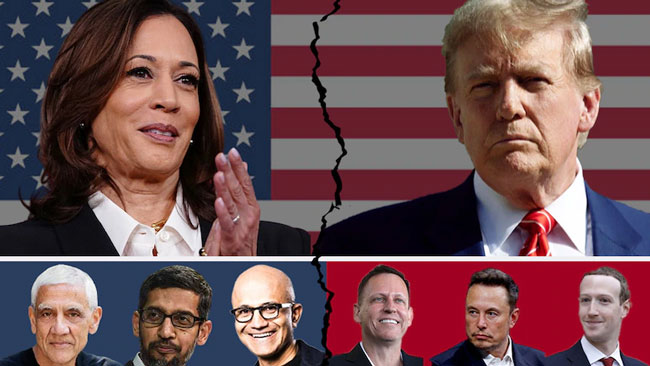As the 2024 U.S. Presidential election approaches, a deepening political divide is taking shape, not only among the electorate but also across Corporate America. Tech giants, banking behemoths, energy firms, and even smaller regional companies are aligning themselves along political lines, backing either Democrat Kamala Harris or Republican Donald Trump. The corporate and financial backing for the candidates reflects ideological splits, policy preferences, and sector-specific interests that are set to play a key role in the outcome of the election on November 5, 2024.
The choice between Harris, considered “liberal and left-leaning,” and Trump, characterized as “protectionist and right-leaning,” is clear, and corporate endorsements are already streaming in.
Tech Behemoths Divided
The tech sector, traditionally seen as left-leaning, has largely thrown its weight behind Kamala Harris. Companies like Microsoft, Google (Alphabet), and Amazon have contributed millions of dollars to Harris’s campaign, according to data from OpenSecrets. Google, under the leadership of Sundar Pichai, contributed $2.16 million, while Microsoft, led by Satya Nadella, donated $1.1 million. Jeff Bezos’s Amazon also chipped in with $1 million.
In contrast, donations to Trump from these same companies have been much smaller—$88,000 from Microsoft and $116,000 from Amazon, marking a significant disparity in support.
Despite the general trend in tech backing Harris, high-profile individuals like Elon Musk and Mark Zuckerberg have come out in favor of Donald Trump. According to the Wall Street Journal, Musk is reportedly donating $45 million each month to America PAC, an organization supporting Trump’s campaign. Zuckerberg has made public comments about his concerns over “censorship” under the Biden administration, while Trump has weaponized these statements to fuel his claims about election integrity.
Prominent venture capitalist Peter Thiel has also rallied behind Trump, while Indian-American billionaire Vinod Khosla and LinkedIn co-founder Reid Hoffman are backing Harris, reflecting a more nuanced split within the tech community.
Banking and Oil Giants Lean Towards Trump
While tech largely aligns with Kamala Harris, the banking and energy sectors are firmly in Trump’s corner. Trump’s promises of reduced taxes, deregulation, and a focus on traditional energy sources like oil and coal resonate with these industries. The ex-president’s skepticism about climate change and his support for oil drilling have won him favor among oil companies and their CEOs.
According to a Bloomberg report, oil executives see Trump’s pro-oil stance as a green light to expand drilling operations, while banking CEOs are eyeing the prospect of increased mergers and acquisitions within the energy sector, driven by the rollback of Biden-era regulations.
Bankers are also banking on Trump to scale back stringent rules implemented by the Biden administration. These regulations have been viewed as barriers to profitability, and many financial executives believe that they will be rolled back under a second Trump administration.
Top Corporate and Individual Contributors to Trump and Harris
According to OpenSecrets, the financial backing for both candidates comes from some of the largest names in corporate America. Here is a breakdown of the top contributors:
Kamala Harris
- Google (Alphabet): $2.16 million
- Microsoft: $1.1 million
- Amazon: $1 million
- Vinod Khosla (Co-founder, Sun Microsystems): Major contributor
- Reid Hoffman (Co-founder, LinkedIn): Major contributor
Donald Trump
- Elon Musk (CEO, Tesla & SpaceX): $45 million monthly to America PAC
- Mark Zuckerberg (CEO, Meta): Publicly supporting Trump, donations undisclosed
- Peter Thiel (Venture Capitalist): Major supporter
- Oil Companies: Strong financial backing, particularly from CEOs
- Banking Giants: Significant backing due to Trump’s deregulation promises
The Road to November 5, 2024
As the election approaches, corporate endorsements and contributions will likely intensify, with both campaigns leveraging financial backing from their respective sectors. The tech industry’s overwhelming support for Harris stands in stark contrast to Trump’s alliance with the oil and banking sectors. These divisions highlight how policy preferences—ranging from environmental regulations and energy policy to technology and censorship—are shaping the political landscape in the lead-up to November’s election.
For the American public, the question remains whether the influence of Corporate America, divided as it is, will have a decisive impact on the 2024 election. Both candidates have attracted influential backers, and their differing approaches to the economy, regulation, and energy are likely to sway voters across the political spectrum. The election promises to be not just a battle between candidates, but also a reflection of the deep-rooted divides within American industry and society.




